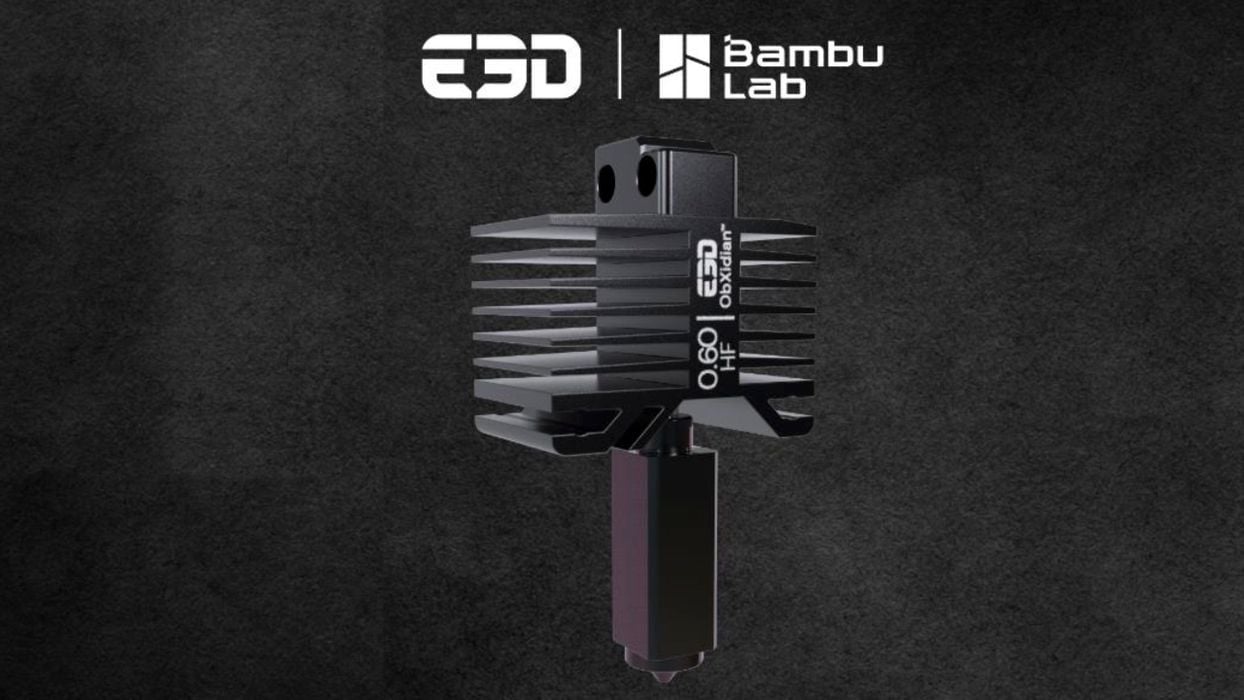
The Bambu Lab ecosystem is expanding with other suppliers.
Bambu Lab is perhaps the most disruptive company currently operating in the 3D print market. Their equipment, designed specifically for reliability and now consumer use, have deeply affected the markets for both desktop and professional 3D printer manufacturers.
Up to now the company has primarily relied on their own equipment, software and materials. But that’s changing with a couple of interesting announcements.
The first is perhaps the most important: They’ve struck a deal with noted component manufacturer E3D to provide aftermarket high performance upgrades for the X1 and P1 series of 3D printers.
The “E3D Upgrade” provides a “drop in” replacement for the standard Bambu Lab hot end, and instantly enables a whopping 60% increase in flow rate capacity. The upgrade kit also includes a hardened nozzle, E3D’s ObXidian, and their E3DLC non-stick coating.
The upgrade kit was developed by a joint team from both Bambu Lab and E3D, and is an officially licensed product. Incredibly, the cost of the upgrade kit is only £60 (US$75).
Bambu Lab CEO Dr Ye Tao said:
“By incorporating the E3D Upgrade into Bambu Lab 3D printers, we propel ourselves forward, amplifying printer performance, pushing the boundaries of what our printers can achieve, and enhancing the user experience. This collaboration strengthens our commitment to delivering state-of-the-art 3D printing solutions that empower creators.”
The second announcement we encountered was from 3DQue, the Vancouver-based startup that produces management software for farms of 3D printers. Their AutoFarm3D product allows seamless operation of vast numbers of 3D printers in a very efficient manner.
3DQue announced “early access” to a new version of AutoFarm3D that supports the X1C, P1P and P1S machines from Bambu Lab.
This is quite important, as the reliability and productivity of the Bambu Lab machines has resulted in many growing print farms composed solely of these machines. AutoFarm3D could be an effective tool to manage such large print farms.
However, as it is what appears to be a beta test-level release, users are for the moment restricted to a maximum of ten Bambu Lab devices in their AutoFarm3D configuration.
Finally, there’s rumors of Bambu Lab marketing a bundle of a 3D printer with a UPS system from EcoFlow, a noted provider of uninterruptible power supplies. Curiously, these do not appear on Bambu Lab’s online store, yet searches do point to pages that have been indexed by search engines.
Whatever is going on, it sounds like Bambu Lab recognizes that many of their customers are using the equipment for production purposes, and therefore continuously available power is a requirement. Why not sell that capability to the customers at the same time as the 3D printer? This makes a great deal of sense to me.
Finally, it seems now quite clear that Bambu Lab is branching out and affixing strong anchor points to an ecosystem that goes well beyond their own operations. That’s very good news for the company and its customers, as these partnerships and added features will absolutely make their equipment even more attractive, if that’s even possible.
